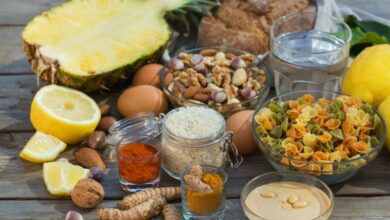Features of Nutrition in Advanced Age

How does nutrition change with advancing age?
Dietary needs vary depending on age and gender. The required foods and beverages that constitute a healthy diet often differ significantly from those beneficial for consumption at a younger age. Overall, the need for some foods decreases, while the necessity for others increases.
However, healthy eating doesn’t change drastically with age, especially with an already established good dietary regimen. Specific dietary needs for each individual must be clarified, and food choices should be adjusted to ensure the body receives precisely what it needs to maintain good health in advanced age.
Nutrition in advanced age also varies depending on gender, with older men requiring different foods than older women. Throughout life, men generally need more energy (calories or kilojoules) per day than women. This is because, on average, men tend to be larger and have more muscle mass.
The amount of energy the body needs each day depends on both age and activity levels. However, as the body begins to lose muscle mass with age (sarcopenia), and activity levels also decline, it doesn’t mean that one needs fewer nutrients. In fact, the requirements for nutrients (carbohydrates, fats, proteins, vitamins, minerals, fiber, water) generally remain the same and sometimes increase.
Calcium is a good example of the latter. The need for calcium for healthy bones and teeth increases with age. Therefore, additional servings of low-fat milk, yogurt, and cheese are important for the diet. Other good sources of calcium include canned salmon, sardines, leafy greens like spinach, kale, and bok choy, sesame seeds (and tahini), and almonds.
It’s important to discuss any major changes in eating patterns or physical activities with a specialist. Adjustments to medications may be necessary for the patient.
Which foods are beneficial to consume in advanced age?
Following a healthy diet brings physical, mental, and social benefits. Poor food and drink choices expose individuals to a greater risk of developing chronic diseases, such as cardiovascular diseases, type 2 diabetes, some types of cancer, and even mental health problems like anxiety and depression. Adhering to a healthy diet also provides social benefits – regular social interactions can prevent loneliness and isolation.
Consuming a wide variety of foods from the five food groups – colorful vegetables, legumes (such as peas or beans), fruits, mostly whole grains rich in fiber, lean meat and poultry, fish, eggs, tofu, nuts, and seeds, and low-fat dairy or dairy alternatives – is necessary.
Regular fish consumption can reduce the risk of cardiovascular diseases, stroke, dementia, and macular degeneration (a type of vision loss). Eating fish twice a week is sufficient to obtain the necessary nutrients.
Intake of large amounts of water, six to eight glasses per day, and more during hot weather or during exercise, is crucial. Water is essential for hydration, digestion, and blood volume. In advanced age, the sensation of thirst is reduced even when the body needs fluids. Water is the best choice for hydration, but tea, coffee, mineral water, and sparkling water, as well as low-fat milk, are also important. The consumption of fiber-rich foods and plenty of fluids stimulates bowel movements.
Limiting foods high in saturated fats, such as biscuits, cakes, pastries, pies, processed meats, burgers, pizza, fried foods, potato chips, and other savory snacks, is necessary.
It is useful to replace foods high in saturated fats (primarily containing saturated fats) with foods containing mostly polyunsaturated and monounsaturated fats. It is also important to limit foods and drinks with added salt, and salt should not be added to foods during cooking or at the table.
Everyone needs a small amount of salt intake, but too much salt can increase the risk of high blood pressure and cardiovascular diseases. Care should be taken regarding the intake of high-salt foods, such as processed meats (like ham, beef, bacon), savory snacks (such as chips and snacks), and sauces (such as soy sauce). Choosing food with reduced salt content when shopping is recommended, and flavoring during cooking with herbs and spices instead of salt is beneficial.
It is also important to limit the intake of foods and drinks containing added sugars, such as sweets, sugar-sweetened soft drinks, fruit drinks, energy and sports drinks.
Limiting alcohol intake is an important step in maintaining good health in advanced age, with healthy men and women advised not to consume more than two drinks per day.

